Destroy A Currency, Extend A Rally Nov 7, 2014
Doug
Wakefield
What
was I thinking? Goodbye
All Time Highs? I must have lost my mind to have forgotten that central
bankers have unlimited tools to inflate stock bubbles.
Actually,
the last 2 weeks have only shown me even more, how desperate the actions of
central banks, and how passionate the majority of traders just to hear the
words, “all time high” one more time.
But
as always, I encourage you NOT to take my word or my opinion, but to think for
yourself. Is it really worth a few more
days of a power rally, solely at the continued expense of a nation’s currency
and entire economy?
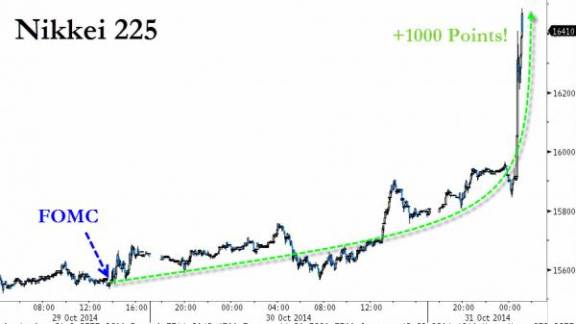
[Source
– Markets
Explode Higher As Bank of Japan Goes All-In-er; Increases QE To JPY 80 Trillion,
Zero Hedge, Oct 31 ‘14]
First,
we can see from the chart above, that an announcement made the Bank of Japan to
increase yet once again their debt load and direct purchases of their own stock
market, contributed to the 1,000 points rally in under a day. That’s right, by
printing up more debt out of thin air, and tripling their purchases of exchange
traded funds based on the Nikkei, we have “victory”. But at what costs?
Considering
the fact that this announcement was made on Oct 31st, and two days
earlier the Federal Reserve’s QE program would go to zero effective November
1st, the next “support” for the stock bubble by the global central bankers
certainly arrived quickly.
Fed
Ends 6 – Year Effort To Stimulate Economy, CNN Money, Oct 29 ‘14
Bank
of Japan Sails Further Into Uncharted Territory, WSJ, Oct 31 ‘14
When
looking at some indicators of “extreme happiness” coming in this last week, it
would seem that the “nirvana effect” for stocks roared back even stronger than
the price movement of US and Japanese stocks.
The
bearish percentage of AAII (American Association of Individual Investors) survey dropped to a multi-year low of 15%,
Investor’s Intelligence reported that newsletter bulls jumped the most in 40
years, and investors poured $17 billion into S&P 500 exchange traded funds
over the two weeks ending on Oct 31st, marking a 4 year high. *
So
how could I have been so foolish two weeks ago, to have stated “Goodbye
All Time High” in the title of an article. Actual, it is simple. I had
believed then, as I do even more now, that time was running out on “all time
high” stock headlines. As of today, since that has already occurred again, the
question now becomes, “So now what?”
Are things once again “back to normal”?
Are
we mad? Do any of these “experts” ever consider the longer-term problem of
selling these ever expanding war chests of assets owned by the Bank of Japan…or
European Central Bank, or Federal Reserve, etc, etc? After six years of these
same tricks, in an attempt to convince the public that wilder speculation is
equal to economic growth, isn’t it time to admit that printing up even MORE
debt, is a negative rather than a positive for the long term success of capital
markets or the economic life of nations?
Of course, who wants to look for long-term solutions, when you can
create the “image” of financial “success” in a day.
For
6 years, the world’s central banks have acted in the role of “purchaser of last
resort”, adding trillions in additional debt to the nation states of the world,
and placing an even larger drag on global economic growth.
While
the last 3 weeks have produced the image of “unstoppable bull”, it has also
followed a great lesson one of my subscribers, a professional trader, shared
with me several years ago. The idea; when you look at where money is going into
or leaving, look at other markets in the world to determine where that money
could be following a totally opposite path.
So
in a world focused on “stocks always go up because central bankers have our
backs”, let me turn to Albert Edwards, Co-Head of Global Strategy at Societe
Generale, and a chart of where money was EXITING.
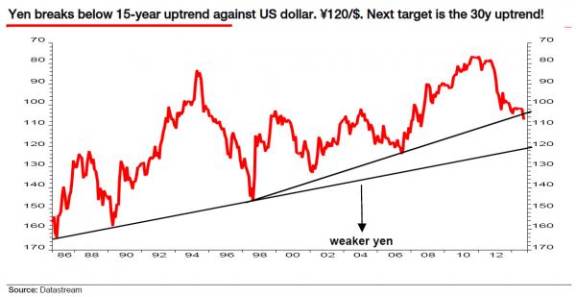
[Source
– Albert
Edwards Presents “The Most Important Chart for Investors”, ZH, Sept 22 ’14,
repeated again in “The
Most Important Chart for Investors” Flashback, and Why USDJPY 120 Is Now Coming
Fast, ZH, Oct 31 ‘14]
The
top price in the strengthening yen trend was attained on Oct 27, 2011. With
this in mind, the big move down in the yen, and up in the Nikkei last Friday,
Oct 31st, must be seen as a desperate attempt to keep “pushing on a
string”, or a trend that has already been in place for 3 years. The holdings by
the commercial hedgers -the very well
financed money – have also been showing extremes in the US dollar, euro, and
yen over the last couple of months, and anyone who understands futures,
understands that when the commercial hedgers are at extremes, it is the crowd
that has managed to find themselves at the total opposite end of the seesaw.
On
Thursday, Oct 30th, the USDJPY stood at 108.73. Today, six trading
days later, it stood at 115.57.
Clearly, if this trend does continue at this pace, the yen would hit its
30-YEAR trendline of 120 in another week or so. Then what?
Either
way, the extreme volatility we have watched since the Sept 19th
high, continues to remind us that it would be very naďve at this stage in a
68-month rally from the March 2009 bottom to expect an ending stream of “all
time high” headlines, with no longer term market consequences. At some point,
central bankers must face the reality of acting as “purchasers of last resort”
for the last six years.
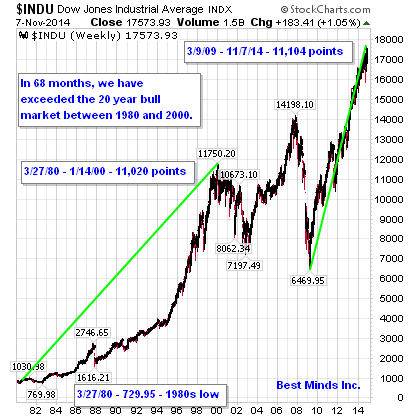
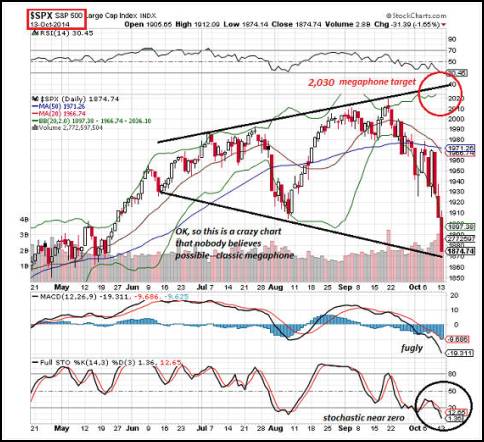
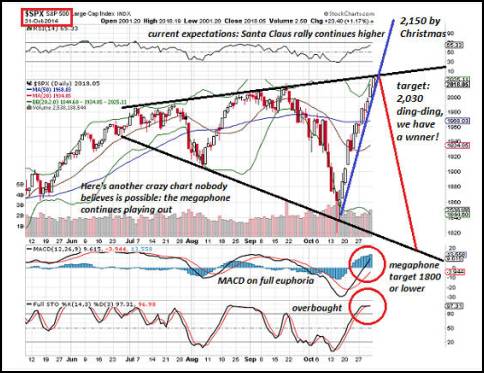
[Source
of two chart of the S&P 500 was Charles Hugh Smith in his recent article, About
that “S&P Will Be 2,150 by Christmas” Call, Nov ‘14.]
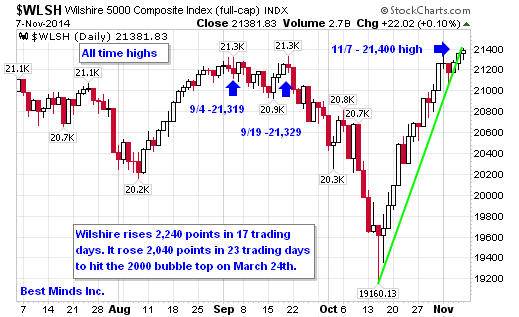
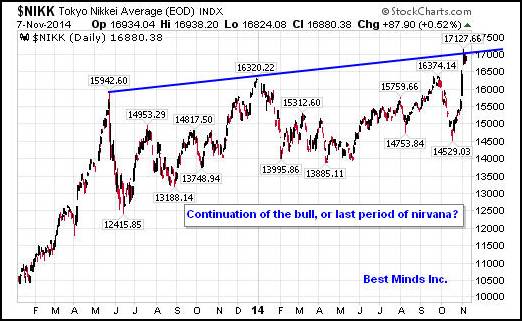
“Vogue
editor Diana Vreeland’s motto, ‘Fake it, fake it’, is now the First Commandment
of the spin-doctor and the commercial maker. As Vreeland advises, ‘Never worry
about the facts. Project an image to the public.’ The art of success is to
create a world ‘as you feel it to be, as you wish it to be, as you wish it into
being.’” [When
No One Sees: The Importance of Character in an Age of Image (2000), Os
Guinness, pg 2.2]
Isn’t
it time to “worry about the facts”?
Careful
What You Wish For: Plunging Yen Leads to 140% Surge in Bankruptcies, ZH,
Oct 30 ‘14
*
The stats were pulled from the home page of www.sentimentrader.com.
Complacency Time Has Gone
If
you have no experience in growing money on the downside of a financial
bubble, I cannot think of a better time to subscribe to The Investor’s Mind. It
is amazing with all the hype given “another all time high” since the start of
2013, how little attention has been given to various world markets that have
not returned to that level since reaching it in 2008, 2000, and yes, even 1990.
The
cost for procrastination is rising rapidly, and the value for good research
becoming extremely low in comparison to the speed in which wealth can be
destroyed. Click here
to start the next six months reading the newsletters and trading reports as
we come through this incredible period in market history, and attain my latest
special edition of The Investor’s Mind: At the Top of the World. This issue,
completed on Oct 23rd, will be completely revised two weeks from
today, November 21st, when monthly equity options expire.
Doug
Wakefield
President
Best Minds Inc. a Registered Investment
Advisor
1104
Indian Ridge
Denton,
Texas 76205
Phone
- (940) 591 - 3000
Best Minds, Inc is a registered investment advisor that
looks to the best minds in the world of finance and economics to seek a
direction for our clients. To be a true advocate to our clients, we have found
it necessary to go well beyond the norms in financial planning today. We are
avid readers. In our study of the markets, we research general history, financial
and economic history, fundamental and technical analysis, and mass and
individual psychology.